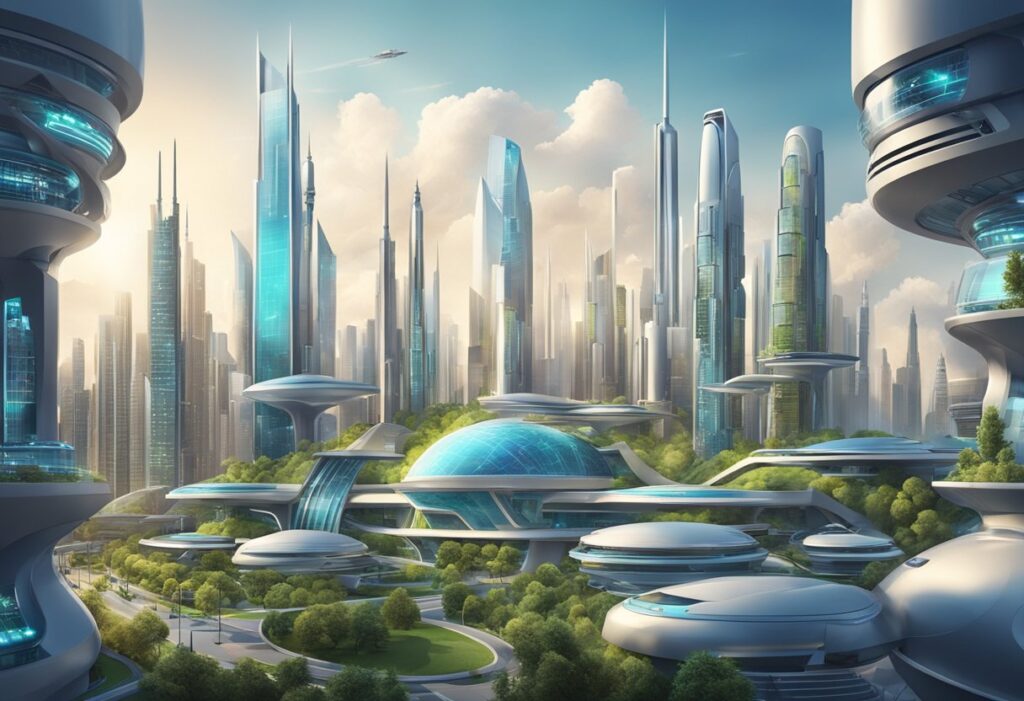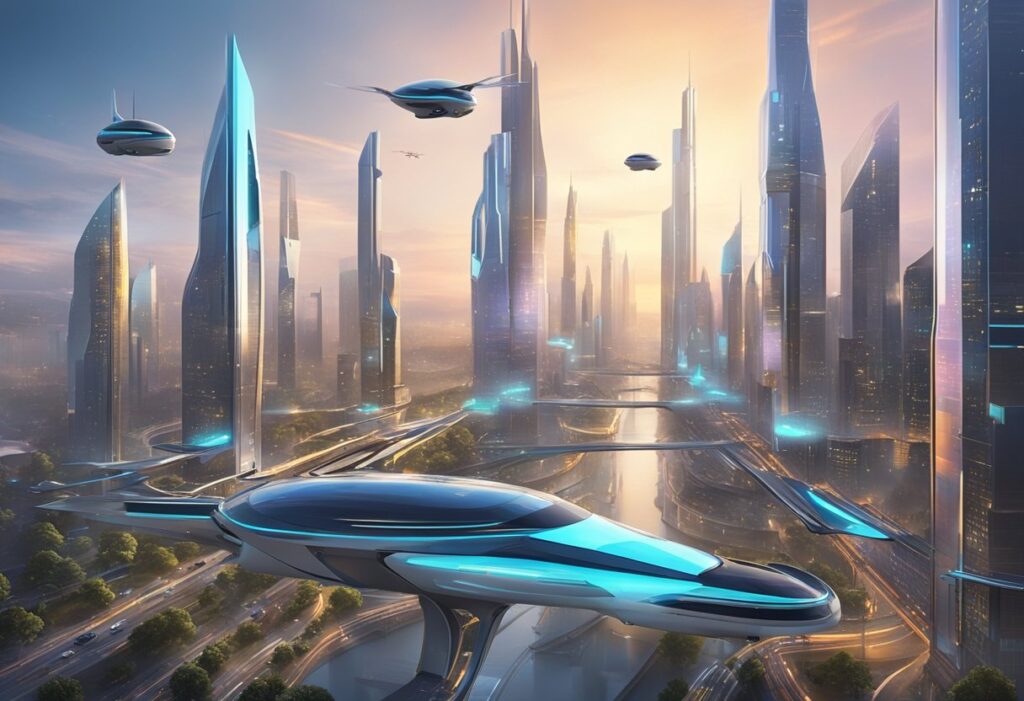Emerging technologies are transforming the world at an unprecedented pace, and it is difficult to keep up with the latest developments. In this article, we will explore 20 emerging technologies that are set to change the world in the near future. From artificial intelligence to renewable energy, these technologies have the potential to revolutionize the way we live, work, and interact with each other.

Artificial intelligence (AI) is one of the most promising emerging technologies, with applications ranging from healthcare to transportation. Machine learning algorithms are becoming increasingly sophisticated, enabling computers to perform tasks that were previously thought to be the exclusive domain of humans. In addition, AI is being used to analyze vast amounts of data, providing insights that were previously impossible to obtain. Other emerging technologies include biotechnology, renewable energy, and quantum computing, all of which have the potential to transform the world in their own unique ways.
Fundamental Concepts in Emerging Technologies

Defining Emerging Technologies
Emerging technologies are those that are currently being developed or are expected to be developed in the near future. These technologies have the potential to significantly impact various aspects of society, including the economy, healthcare, and the environment. They are characterized by their novelty, complexity, and potential for disruption.
The Importance of Innovation
Innovation is a key driver of emerging technologies. It involves the creation of new ideas, products, and services that have the potential to transform the world. Innovation is essential for the development of emerging technologies because it enables researchers and developers to explore new ideas, experiment with new approaches, and push the boundaries of what is possible.
Assessing Technology Impact
Assessing the impact of emerging technologies is crucial to ensuring that they are developed and deployed in a responsible and sustainable manner. This involves considering the potential benefits and risks of the technology, as well as its potential impact on society and the environment. It is important to involve a range of stakeholders in this process, including researchers, policymakers, industry experts, and members of the public.
In summary, emerging technologies are novel, complex, and have the potential to significantly impact society. Innovation is a key driver of emerging technologies, and assessing their impact is crucial to ensuring their responsible and sustainable development.
Technologies Transforming Industries

Artificial Intelligence and Machine Learning
Artificial intelligence (AI) and machine learning (ML) are transforming various industries, including healthcare, finance, and transportation. AI and ML are enabling machines to learn from data and make decisions without human intervention. In healthcare, AI and ML are helping doctors to diagnose diseases accurately and develop personalized treatment plans. In finance, AI and ML are being used for fraud detection, credit scoring, and investment analysis. In transportation, AI and ML are being used to develop self-driving cars and optimize traffic flow.
Blockchain and Distributed Ledger Technology
Blockchain and distributed ledger technology (DLT) are transforming industries by providing secure and transparent ways to record transactions. Blockchain and DLT are being used in industries such as finance, supply chain management, and healthcare. In finance, blockchain and DLT are being used for secure and fast cross-border payments and to create new financial products. In supply chain management, blockchain and DLT are being used to track products from the manufacturer to the end consumer, providing transparency and accountability. In healthcare, blockchain and DLT are being used to securely store and share patient data.
Internet of Things (IoT) and Smart Devices
The Internet of Things (IoT) and smart devices are transforming industries by enabling the collection and analysis of vast amounts of data. IoT and smart devices are being used in industries such as manufacturing, agriculture, and energy. In manufacturing, IoT and smart devices are being used to optimize production processes and improve product quality. In agriculture, IoT and smart devices are being used to monitor crops and livestock, improving yields and reducing costs. In energy, IoT and smart devices are being used to optimize energy consumption and reduce waste.
Advanced Robotics and Automation
Advanced robotics and automation are transforming industries by enabling machines to perform tasks that were previously done by humans. Advanced robotics and automation are being used in industries such as manufacturing, healthcare, and logistics. In manufacturing, advanced robotics and automation are being used to improve efficiency and reduce costs. In healthcare, advanced robotics and automation are being used to assist with surgeries and to provide care for patients. In logistics, advanced robotics and automation are being used to optimize warehouse operations and improve supply chain efficiency.
Biotechnology and Genetic Engineering
Biotechnology and genetic engineering are transforming industries by enabling the development of new treatments and products. Biotechnology and genetic engineering are being used in industries such as healthcare, agriculture, and energy. In healthcare, biotechnology and genetic engineering are being used to develop new drugs and therapies, including personalized medicine. In agriculture, biotechnology and genetic engineering are being used to develop crops that are resistant to pests and diseases. In energy, biotechnology and genetic engineering are being used to develop new biofuels and improve energy production from renewable sources.
Societal and Ethical Implications

Privacy and Data Security
As emerging technologies become more integrated into our daily lives, concerns around privacy and data security continue to grow. With the rise of the Internet of Things (IoT), more devices are now connected to the internet, and this has created new avenues for hackers to exploit. In addition, the increasing amount of data that is being collected by these devices raises questions about who has access to this data and how it is being used. To address these concerns, companies and governments need to prioritize data security and adopt best practices for protecting user privacy.
Ethical AI and Algorithmic Bias
Artificial Intelligence (AI) is one of the most promising emerging technologies, but it also comes with a host of ethical concerns. One of the biggest concerns is algorithmic bias, which occurs when AI systems are trained on biased data, leading to discriminatory outcomes. This is especially problematic in areas such as hiring, where AI systems may inadvertently discriminate against certain groups of people. To address this issue, companies need to ensure that their AI systems are trained on diverse data sets and that they are regularly audited for bias.
Sustainable Technologies and Environmental Impact
As the world becomes more aware of the impact of climate change, there is growing demand for sustainable technologies that can help reduce our carbon footprint. From renewable energy sources such as solar and wind power to electric vehicles, there are a wide range of emerging technologies that can help us transition to a more sustainable future. However, it is important to ensure that these technologies are developed in a way that is environmentally responsible and that they do not cause unintended harm to the environment. Companies and governments need to work together to develop sustainable technologies that can help us address the urgent challenges of climate change.
Future Projections and Challenges

Predicting Technological Convergence
As emerging technologies continue to develop, it is likely that they will converge and create new opportunities for innovation. For example, the integration of artificial intelligence and blockchain could lead to the creation of decentralized autonomous organizations (DAOs) that operate without human intervention. Predicting which technologies will converge and how they will impact the world is a difficult task, but it is essential for businesses and governments to stay ahead of the curve.
Overcoming Implementation Barriers
While emerging technologies offer many benefits, implementing them can be a challenge. Many businesses and governments struggle with the cost and complexity of adopting new technologies. Additionally, there may be regulatory or legal barriers that prevent widespread adoption. Overcoming these barriers will require collaboration between businesses, governments, and other stakeholders to develop solutions that address these challenges.
Preparing for Workforce Transformation
The emergence of new technologies will inevitably lead to changes in the workforce. While some jobs may become obsolete, new jobs will also be created. However, there may be a skills gap that prevents workers from taking advantage of these new opportunities. To address this challenge, businesses and governments must work together to provide training and education programs that prepare workers for the jobs of the future. Additionally, policies that support workers during the transition period may be necessary to ensure that no one is left behind.
In conclusion, while emerging technologies offer many exciting opportunities, there are also significant challenges that must be addressed. By predicting technological convergence, overcoming implementation barriers, and preparing for workforce transformation, businesses and governments can ensure that they are well-positioned to take advantage of the benefits of these new technologies.




